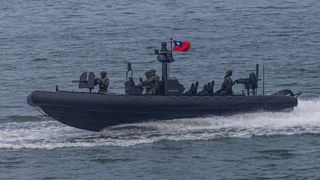Bob Dylan perhaps put it best in one of his classic songs, Subterranean Homesick Blues. He wryly observed: “You don’t need a weatherman to know which way the wind is blowing”. This comment on Dylan’s part had dramatically unforeseen consequences as it inspired a far-left militant movement in the United States initially called the “Weather Men”, later the “Weather Underground”.
They were responsible for a bombing campaign on university campuses across the United States. But the comment remains valid, in that the winds seem to have dropped across the Taiwan Straits. The fervour with which Beijing has launched attacks on the island nation and its close partners, especially the US, has waned somewhat. In what can only be interpreted as a signal to the left of a shift in Chinese Communist Party thinking, the ultimate “Wolf Warrior” and aggressive diplomat Zhao Lijian appears to have been transferred from his role as the Foreign Ministry’s spokesmen to a less public, less influential desk job elsewhere in that department.
Australians will recall it was Zhao who tweeted a vicious and fake photo depicting an Australian soldier holding a bloodied knife to the throat of an Afghan child. This caused fury in Canberra and elsewhere and came to symbolise the tensions between Australia and China towards the end of the Morrison Government.
The election of the Albanese Government may have persuaded China that it was an opportune time to change course and once more be reasonable and realistic in its dealings. China has argued incessantly over recent months for a “reset” in relations between Beijing and Canberra To its credit, the Albanese Government has insisted that links needed to be stabilised before they could be reset.
In particular, Canberra wanted to see the end of the AUD$20 billion tariffs and restrictions on Australian exports, ranging from coal to foodstuffs. The fact the Chinese Ambassador to Australia Xiao Qian recently celebrated the improvement in relations by raising a glass of Barossa Valley red wine sent a very clear message. If it had been a Chilean, French or Spanish wine, the message would have been very different.
In diplomacy, clear messages are often sent by indirect means. For example, as the thaw in relations between China and the United States began gathering strength in 1971, table tennis and pandas assumed critical significance. Behind the scenes, Chinese diplomats were negotiating with Dr Henry Kissinger, the National Security Advisor and Secretary of State to President Richard Nixon.
But the popular imagination across the world focused on China’s decision to play table tennis with its main adversary and provide panda bears to American zoos. Ping-pong diplomacy is real. There are interlocking reasons for Beijing’s recent shift. They range across economic, strategic and the social and political fields.
In all these categories, the CCP is now on the back foot. Strategically, China faces the reality of much closer military relations between the US and Japan, as reflected in the recent visit of Japan’s Prime Minister, Fumio Kishida, to Washington DC. In any conflict over Taiwan, Beijing would face not only Taipei’s military response, but also the combined forces of the US and its Japanese ally.
And Taiwan is doing more in its own defence, having learned the lessons from Ukraine. Ukraine decided to fight, and Taiwan’s decision to triple the length of compulsory military service to 12 months sent a clear message to Beijing and beyond. Second, China’s economic growth has tumbled, and combined with a falling population confirmed by their own National Bureau of Statistics suggests a future far less rosy than previously predicted.
Western assumptions that China would eclipse the United States in economic power this decade appear open to serious challenge. Finally, the Covid-19 pandemic has devastated China. Beijing’s “Zero Covid Policy” has proven dramatically unpopular and has failed utterly. The country now faces serious health challenges, particularly for its senior citizens. Taken in totality, these newly emerging realities make any suggestion of an assault across the Taiwan Straits by China significantly less likely. The Centre for International and Strategic Studies in Washington DC has recently concluded that a war over Taiwan would be won by the US and its allies, admittedly while suffering heavy losses in blood and treasure.
The winds in the Taiwan Strait, for now, are still.






